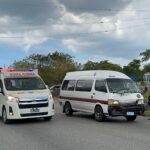By Emmanuel Joseph
Barbados appeared to be treading carefully on Wednesday while the row between sister CARICOM member state Guyana and Venezuela heated up yet another notch.
After the International Court of Justice (ICJ) on Friday ordered Venezuela to refrain from taking any action that would alter the situation in the potentially oil-rich Guyanese territory it claims as its own, and Caracas went ahead with a referendum that it said gave it backing to annex the disputed Essequibo region, Georgetown signalled on Tuesday that it would approach the United Nations Security Council to enforce the order.
Attorney General Anil Nandlall was quoted in the Guyanese media as saying his government would ask the Security Council to impose wide-ranging sanctions or military action against Caracas if the Nicolas Maduro regime breaches the ICJ order.
“We will explore every avenue available and obviously that is an avenue; that is one of if not the most important avenue,” Nandlall said when asked to elaborate on his presentation at an awareness session on the border dispute organised by the Guyana Bar Association.
But when contacted on Wednesday, Barbados’ Ambassador to the Caribbean Community (CARICOM) David Comissiong said Bridgetown will have to give careful attention to the situation before making an informed comment.
“I am not aware that the Guyana Attorney General had made such a statement, and, therefore, it is something I would not want to make an immediate response to. It is something we would need to give some careful thought to,” Comissiong told Barbados TODAY in a brief interview.
“We are conscious that it is a very delicate situation and that we have to be very careful and cautious [about] how we respond to anything because we don’t want to make any missteps. We don’t want to do anything that would worsen a very difficult situation.”
Venezuela declared that a referendum on Sunday which had five questions – including rubber-stamping the regime’s position of not recognising the ICJ’s jurisdiction over the territorial controversy over the Essequibo region; the annexation of the region as a state of Venezuela, the granting of citizenship and Venezuelan identity cards to people living there, and incorporating the would-be state on Venezuelan maps – was supported by 95 per cent of those who voted.
Nandlall told the awareness session that the United States and the United Kingdom, which played a historical role in the 1899 Arbitral Tribunal Award had a “duty to ensure that the process that they engineered and participated in is respected” rather than being bystanders.
He said he was confident that the international partners would not allow the ICJ order to be ignored, as that would amount to a strike against the international legal process, global order, and at the heart of the United Nations itself, with the ICJ as its organ.
Contending that the ICJ orders are binding and enforceable, he argued that the Security Council could take special measures, at the request of Guyana as the injured state, including economic sanctions, travel restrictions and the use of military force including blockades by air, sea and land forces.
“You have a wide range of measures that are available at the level of the ICJ and, by extension, at the level of the UN Security Council to enforce decisions of the ICJ,” said Nandlall.
In Caracas, the National Electoral Council said more than 10 million people voted in a referendum but critics have claimed that it suffered from an extremely low voter turnout.
Earlier this week, President Irfaan Ali cautioned the Venezuelan government against creating conditions that could worsen economic and social problems for ordinary Venezuelans and exacerbate migration and security problems in Latin America and the Caribbean.
emmanueljoseph@barbadostoday.bb
The post Foreign ministry in ‘careful thought’ on Guyana-Venezuela row appeared first on Barbados Today.


